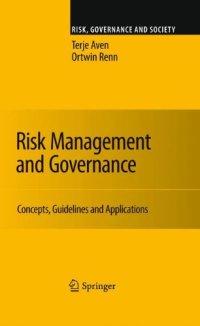
Ebook: Risk Management and Governance: Concepts, Guidelines and Applications
Author: Terje Aven Ortwin Renn (auth.)
- Genre: Business // Management
- Tags: R & D/Technology Policy, Quality Control Reliability Safety and Risk, Methodology of the Social Sciences, Political Science general, Environmental Management, Nanotechnology
- Series: Risk Governance and Society 16
- Year: 2010
- Publisher: Springer-Verlag Berlin Heidelberg
- Edition: 1
- Language: English
- pdf
Risk is a popular topic in many sciences - in natural, medical, statistical, engineering, social, economic and legal disciplines. Yet, no single discipline can grasp the full meaning of risk. Investigating risk requires a multidisciplinary approach. The authors, coming from two very different disciplinary traditions, meet this challenge by building bridges between the engineering, the statistical and the social science perspectives. The book provides a comprehensive, accessible and concise guide to risk assessment, management and governance. It includes formal approaches to risk analysis without assuming a high level of mathematical proficiency but it also offers reflection and deliberation about the socio-political context in which risk issues are embedded. A basic pillar for the book is the risk governance framework proposed by the International Risk Governance Council (IRGC). This framework offers a comprehensive means of integrating risk identification, assessment, management and communication. The authors develop and explain new insights and add substance to the various elements of the framework. The theoretical analysis is illustrated by several examples from different areas of applications.
Risk is a popular topic in many sciences - in natural, medical, statistical, engineering, social, economic and legal disciplines. Yet, no single discipline can grasp the full meaning of risk. Investigating risk requires a multidisciplinary approach. The authors, coming from two very different disciplinary traditions, meet this challenge by building bridges between the engineering, the statistical and the social science perspectives. The book provides a comprehensive, accessible and concise guide to risk assessment, management and governance. A basic pillar for the book is the risk governance framework proposed by the International Risk Governance Council (IRGC). This framework offers a comprehensive means of integrating risk identification, assessment, management and communication. The authors develop and explain new insights and add substance to the various elements of the framework. The theoretical analysis is illustrated by several examples from different areas of applications.